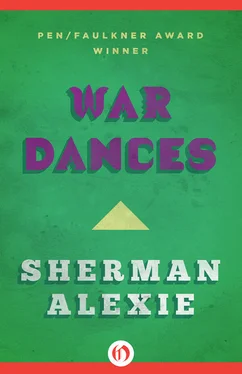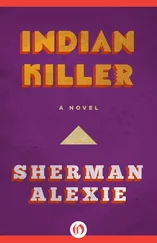“Hello,” I said to the receptionist. “This is George Wilson. I’m watching your coverage of the protests and I must issue a correction.”
“Wait, what?” the receptionist asked. “Are you really George Wilson?”
“Yes, I am.”
“Hold on,” she said. “Let me put you straight through to the producer.”
So the producer took the call and, after asking a few questions to further confirm my identity, he put me on live. So my voice played over images of Althea Riggs weeping and wailing, of her screaming at the sky, at God. How could I have allowed myself to be placed into such a compromising position? How could I have been such an idiot? How could I have been so goddamn callous and self-centered?
“Hello, Mr. Wilson,” the evening news anchor said. “I understand you have something you’d like to say.”
“Yes.” My voice carried into tens of thousands of Seattle homes. “I am watching the coverage of the protest, and I insist on a correction. I am not a white man. I am an enrolled member of the Spokane Tribe of Indians.”
Yes, that was my first official public statement about the death of Elder Briggs. It didn’t take clever editing to make me look evil; I had accomplished this in one take, live and uncut.
I was suddenly the most hated man in Seattle. And the most beloved. My fellow liberals spoke of my lateral violence and the destructive influence of colonialism on the indigenous, while conservatives lauded my defensive stand and lonely struggle against urban crime. Local bloggers posted hijacked footage of the most graphically violent films I’d edited.
And finally, a local news program obtained rough footage of the film I’d been working on when Elder Briggs broke into my house. Though I had, through judicious editing, been trying to protect the young actress, a black actress, the news only played the uncut footage of the obviously frightened and confused woman. And when the reporters ambushed her — her name was Tracy — she, of course, could only respond that, yes, she felt as if she’d been violated. I didn’t blame her for that; I agreed with her. But none of that mattered. I could in no way dispute the story — the cleverly edited series of short films — that had been made about me. Yes, I was a victim, but I didn’t for one second forget that Elder Briggs was dead. I was ashamed and vilified, but I was alive.
I spent most of that time alone in my basement, in the room where I had killed Elder Briggs. When one spends that much time alone, one ponders. And when one ponders, one creates theories — hypotheses, to explain the world. Oh, hell, forget rationalization; I was pissed, mostly at myself for failing to walk away from a dangerous situation. And I was certainly pissed at the local media, who had become as exploitative as any pornographic moviemaker. But I was also pissed at Althea and Elder Briggs.
Yes, the kid was a decent athlete; yes, the kid was a decent student; yes, the kid was a decent person. But he had broken into my house. He had smashed my window and was stealing my DVDs and, if I had not been home, would have stolen my computer and television and stereo and every other valuable thing in my house. And his mother, Althea, instead of explaining why her good and decent son had broken and entered a stranger’s house, committing a felony, had instead decided to blame me and accuse me of being yet another white man who was always looking to maim another black kid — had already maimed generations of black kids — when in fact I was a reservation Indian who had been plenty fucked myself by generations of white men. So, Althea, do you want to get into a pain contest? Do you want to participate in the Genocidal Olympics? Whose tragic history has more breadth and depth and length?
Oh, Althea, why the hell was your son in my house? And oh, my God, it was a Little League baseball bat! It was only twenty inches long and weighed less than three pounds. I could have hit one hundred men in the head — maybe one thousand or one million — and not done anything more than given them a headache. But on that one day, on that one bitter afternoon, I took a swing — a stupid, one-handed, unlucky cut — and killed a kid, a son, a young man who was making a bad decision but who maybe had brains and heart and soul enough to stop making bad decisions.
Oh, Jesus, I murdered somebody’s potential.
Oh, Mary, it was self-defense, but it was still murder. I confess: I am a killer.
How does one survive these revelations? One just lives. Or, rather, one just finally walks out of his basement and realizes that the story is over. It’s old news. There are new villains and heroes, criminals and victims, to be defined and examined and tossed aside.
Elder Briggs and I were suddenly and equally unimportant.
My life became quiet again. I took a job teaching private-school white teenagers how to edit video. They used their newly developed skills to make documentaries about poor brown people in other countries. It’s not oil that runs the world, it’s shame. My Max was always going to love me, even when he began to understand my limitations, I didn’t know what my wife thought of my weaknesses.
Weeks later, in bed, after lovemaking, she interrogated me.
“Honey,” she said.
“Yes,” I said.
“Can I ask you something?”
“Anything.”
“With that kid, did you lose your temper?”
“What do you mean?” I asked.
“Well, you have lost your temper before.”
“Just one time.”
“Yes, but you broke your hand when you punched the wall.”
“Do you think I lost my temper with Elder Briggs?” I asked.
My wife paused before answering, and in that pause I heard all her doubt and fear. So I got out of bed, dressed, and left the house. I decided to drive to see a hot new independent film — a gory war flick that pretended to be antiwar — but first stepped into a mini-mart to buy candy I could smuggle into the theater.
I was standing in the candy aisle, trying to decide between a PayDay and a Snickers, when a group of young black men walked into the store. They were drunk or high and they were cursing the world, but in a strangely friendly way. How is it that black men can make a word like motherfucker sound jovial?
There are people — white folks, mostly — who are extremely uncomfortable in the presence of black people. And I know plenty of Indians — my parents, for example — who are also uncomfortable around black folks. As for me? I suppose I’d always been the kind of nonblack person who celebrated himself for not being uncomfortable around blacks. But now, as I watched those black men jostle one another up and down the aisles, I was afraid — no, I was nervous. What if they recognized me? What if they were friends of Elder Briggs? What if they attacked me?
Nothing happened, of course. Nothing ever really happens, you know. Life is infinitesimal and incremental and inconsequential. Those young black men paid for their energy drinks and left the store. I paid for my candy bar, walked out to my car, and drove toward the movie theater.
One block later, I had to hit my brakes when those same black guys jaywalked across the street in front of me. All of them stared me down and walked as slowly as possible through the crosswalk. I’d lived in this neighborhood for years and I’d often had this same encounter with young black men. It was some remnant of the warrior culture, I suppose.
When it had happened before, I had always made it a point to smile goofily and wave to the black men who were challenging me. Since they thought I was a dorky white guy, I’d behave like one. I’d be what they wanted me to be.
But this time, when those black men walked in slow motion in front of me, I did not smile or laugh. I just stared back at them. I knew I could hit the gas and slam into them and hurt them, maybe even kill them. I knew I had that power. And I knew that I would not use that power. But what about these black guys? What power did they have? They could only make me wait at an intersection. And so I waited. I waited until they walked around the corner and out of my vision. I waited until another driver pulled up behind me and honked his horn. I was supposed to move, and so I went.
Читать дальше












